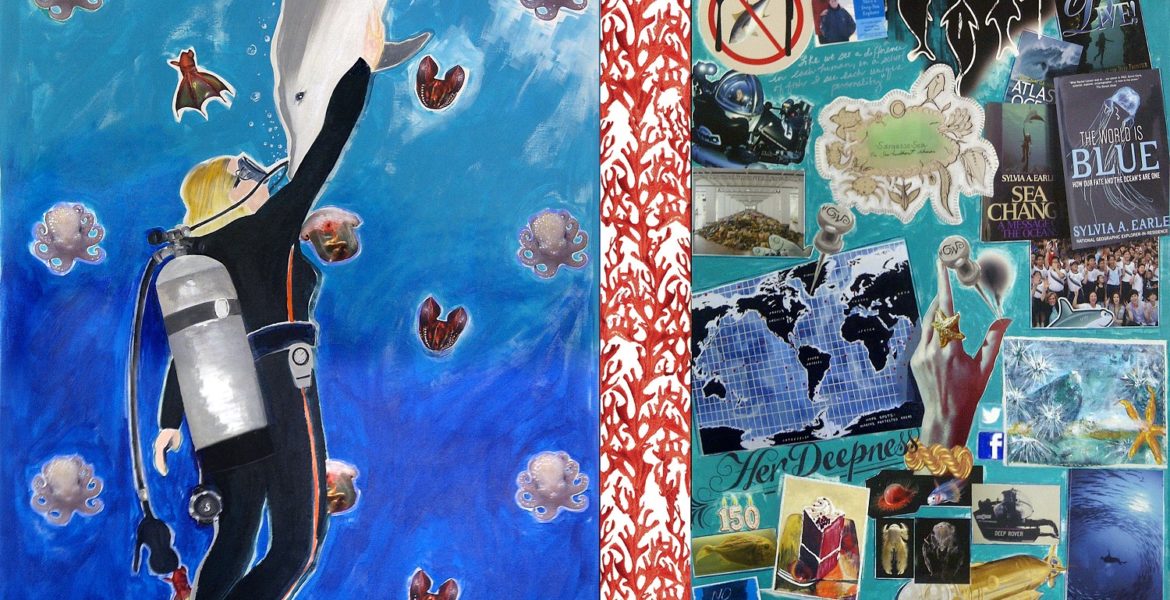Jennifer White Kuri is a figurative abstract artist who has spent 10 years working on the Global Women Project (GWP). This venture is an evolving cycle of portraits that chronicles extraordinary and inspiring women who are influential in their respective countries.
“Each of them is working to change their social, political and physical environments for the better,” said White Kuri. The women are portrayed with objects and images that define their personalities, their professional and spiritual sides, and influences from their various cultures.
“Through painting, I wanted to offer inspiration and hope to multitudes of women across all borders,” said White Kuri, who has lived in Topanga for two years.
The project consists not just of the finished paintings, but also notations, studies and other preparatory materials leading up to each work. The overall experience of the series includes the process of compiling information and deciding how to translate it to canvas.
“I have long appreciated the conceptual underpinnings and the importance of process in an artistic project,” said White Kuri. “I regard GWP as a social effort, as well as an aesthetic one.”
The Global Women Project Limited Edition Art Book has been exhibited, along with several new portraits, including an oceanographer and an astronaut, at Biennale Arte Dolomiti in the northern Italian Alps. White Kuri’s involvement in the GWP has taken her to many countries, including Bahrain, Mexico and Lebanon. “In Colombia, I sat on a panel looking to incorporate the arts into primary education,” she said. “Education is one of many issues facing humanity. I am keenly aware of a woman’s desire to educate their young. There are 60 million girls across the planet not receiving an education. If they all were educated, imagine the change that could occur in the world.”
“Storytelling through the visual medium of art is inspired by personal life moments,” said White Kuri. “Although I was a protégée of Joan Brown at U.C. Berkeley, it was her teacher, the equally renowned Bay Area figurative master Elmer Bischoff, who encouraged my ‘diaristic’ approach in painting.”
One woman featured in the GWP is Nadine Al Bedair, a Saudi journalist and media personality actively pursuing equal rights for women, including the right to drive. Another, Soula Saad, lives in Topanga. She’s a documentary filmmaker best known for “Beirut Rising” — about the young people’s non-violent movement triggered by the assassination of former Lebanese Prime Minister Rafik Hariri in 2005.
White Kuri says Lebanon is currently enjoying a time of calm and creativity. “The Lebanese are so resilient and it’s such a diverse culture, with 18 different religions and political groups living together peacefully. Lebanon has taken 1.2 million refugees—a country with a population of only three million.”
White Kuri has strong links to Lebanon. Her husband of 20 years, John Kuri, was born there but raised in Los Angeles. Together, they are making a documentary TV series: “Lebanon: A Message to the World.”
She is also working on another series of paintings, “Manifest Your Dreams.” This is the “third phase” of her artistic career. “I’m going deeper into my art and trying different modalities. I’m helping women realize their dreams through portraiture, using art to help people grow.”
Specializing in women’s portraits, White Kuri’s first clients were part of a San Francisco dinner club that’s been going for 40 years. “I interviewed them and distilled their essences from the many things they shared with me. It’s based on some history, their family, material items they might have. Those paintings were exhibited at the Napa Valley Museum for Women’s History Month.”
Each painting takes around four months. Sometimes she works with teams of up to 25 collaborators on big projects, including photographers and calligraphers. “There are so many layers to it. I find out their whole life and then choose 12 to 15 images to feature. I don’t show too much of their face. It’s more than a portrait.”
While she prefers painting women—because they tend to open up to her more as subjects—White Kuri says she loves men. “But there’s an imbalance of energy. I don’t necessarily blame that on men. We as women have to take back our power. We need men, but we need more balance. The world feels a bit testosterone-heavy. Every woman I painted for the GWP is a warrior, putting her life on the line to make a difference. All the things happening now are shaking us awake. But I think there’s going to be another era of great peace.”
At up to seven feet by seven feet, some of White Kuri’s paintings are so huge she needs ladders to paint. White Kuri lives in a two-room barn on Henry Ridge. “An artist always finds a place to paint. I set up in the kitchen with a magnificent view. You have to step over paints to get in the door.”
For more information: globalwomenproject.com


